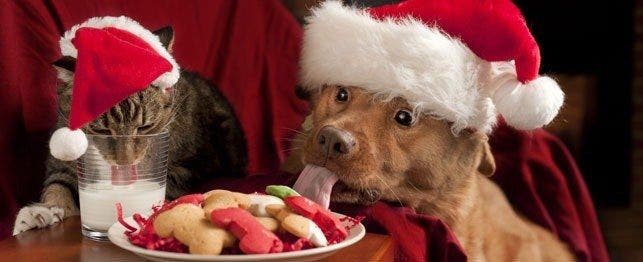
Holiday Foods: What to Share with Your Pet and What to Keep to Yourself
No matter what’s cooking, your pet is bound to show interest. But, be careful —for as many tasty treats there are, there’s just as many dangerous holiday foods for pets.
Fueled by instincts, appetite, and possibly even boredom, pets tend to hang around when the family “chef” occupies the kitchen. They linger under foot, providing great company (albeit while crowding kitchen space) while eagerly awaiting a dropped food morsel.
But the tempting aromas that waft from a kitchen during the holiday season can send your pets into a downright tizzy. The smell smorgasbord created by roasted turkey, smoked ham, and garlic mashed potatoes is enough to drive them dog wild and cat crazy.
It’s the season of giving, and you want to share your holiday feast with your pet. While it’s generally not advisable to serve pets people food — and there are many dangerous holiday foods for pets — there are some exceptions. Here’s our lists of foods to offer or omit from your dog or cat this holiday season.
Holiday Foods to Share with Your Pet
It’s worth stating again – in general, it’s recommended not to serve your food to your pet, or to at least consult your veterinarian before doing so. However, during a special occasion like a holiday dinner, there are a few items you can add scraps of to your pet’s dish once your meal is complete, provided you practice moderation and common sense:
- Lean, white meat: Provided excess fat has been removed and it’s devoid of bones, a small, cut-up piece of chicken or turkey typically provides a safe source of protein for your dog or cat. Plus, your pet will salivate with delight upon receiving this tasty treat.
- Select vegetables: Certain veggies – including carrots, green beans, and cucumber slices – can be shared with your pet. Whether raw or cooked, these veggies should be served without butter and salt. Baby carrots, in particular, represent an exciting, low-calorie treat that can be used for training purposes. Your cat, however, may not show much interest.
- Turkey Broth: Whether canned or homemade, most turkey broths can be used to enhance traditional dog and cat foods. By pouring a small quantity over your pet’s dry food, you can add moisture and flavor that will incite their taste buds.
- White rice: Often used to calm a pet’s upset stomach, white rice can also serve as a special-occasion snack – especially when mixed with turkey broth or small pieces of white chicken.
Holiday Foods to Keep to Yourself — Avoid These Dangerous Holiday Foods for Pets
While it may be difficult to resist a sorrowful face or ignore a persistent whimper or meow, most delectable holiday foods simply have no business on a pet’s plate. Stay true to your convictions, despite your pet’s protest, and remind yourself you’re doing your dog or cat a favor by withholding these items.
In particular, holiday foods that are fatty, spicy, or sweet should be omitted from your pet’s diet. While you’re readily aware these taste categories encompass the bulk of food deliciousness, your pet doesn’t need to know that (and has a different taste palate anyway).
Special care must be made to prevent your dog or cat from obtaining the following toxic holiday food items:
- Alcohol: In addition to causing intoxication, consumption of alcohol can throw off a pet’s acidity balance, potentially causing coma or death.
- Meat bones: As a choking hazard and a possible cause of intestinal bleeding, bones must be removing from any lean meat you serve to your dog.
- Chocolate: While many pet owners are aware of this risk, it can’t be overstated. Chocolate can wreak havoc on a pet’s heart and nervous systems.
- Corn on the cob: When consumed, a corn cob is likely to get lodged in a pet’s intestines, causing risk of an intestinal blockage.
- Nuts: While most varieties should be avoided, Macadamia nuts, in particular, must be kept away from pets for fear of damaging their digestive tracts.
- Onions: Your aunt’s famous cheesy onion casserole is not appropriate for your pet. Poisonous for both dogs and cats, onion consumption can result in anemia for pets.
- Sugar: Keep the candy canes and cookies away from your dog or cat. Similar to with humans, excessive sugar consumption increases the risk of dental issues, obesity, and diabetes for pets.
When in doubt regarding a certain holiday food, it’s best to simply withhold that item from your pet until you can consult your veterinarian. With a proper approach to food-sharing (or lack thereof) this holiday season, you can ensure your pet enjoys a special treat while also maximizing the chance your beloved animal will continue to experience holidays for many years to come.